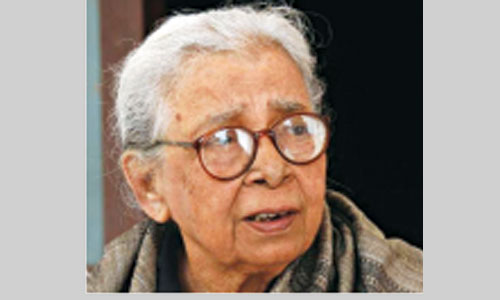Mahasweta Devi dies
Eminent author and social activist Mahasweta Devi breathed her last on Thursday after a multi-organ failure.
The 90-year-old writer was suffering from various ailments and was put on non-invasive ventilation on Thursday after her condition deteriorated.
She was admitted to a hospital in south Kolkata on June 22, 2016 with septicaemia and urinary tract infection.
She was also suffering from diabetes.
She died at 3.16pm after she had suffered a cardiac arrest following the multi-organ failure, reports Indian newspaper Times of India.
A litterateur with the zeal of an activist, Mahasweta Devi used creative expression as a tool to fight for the rights of the ethnic minorities and marginalised sections.
She was the voice of the oppressed in her novels and short stories, which won her a number of awards including the Padma Vibhushan, Magsaysay, Sahitya Akademi and Jnanpith.
Born in Dhaka in 1926, she authored over 120 books, comprising 20 collections of short stories and around 100 novels, and contributed innumerable articles and columns to newspapers and magazines, a large number of them woven around tribal life.
All her acclaimed works like Hajar Churashir Ma (Mother of 1084), Aranyer Adhikar (Right to the Forest, Jhansir Rani (The Queen of Jhansi), Agnigarbha (The Fire Within), Rudali, Sidhu Kanhur Daakey, etc give the readers invaluable insights into the lives of the oppressed class.
A number of her works have been adapted for the silver screen. Govind Nihalani’s 1998 Hindi
film Hazaar Chaurasi
ki Ma (The Mother of 1084) is based on her Bengali novel on the emotional struggles of a mother who tries to understand the reasons behind her son’s involvement in the Naxalite movement.
She founded several grassroots-level societies for the welfare of tribal people.
Mahasweta’s father Manish Ghatak was a well-known poet and novelist who used the pseudonym Jubanashwa. Her paternal uncle was a noted filmmaker Ritwik Ghatak. Mahasweta’s mother, Dharitri Devi, was also a writer and a social worker.
Mahasweta’s first schooling was in Dhaka, but after the partition of India she moved to West Bengal in India.
She joined Rabindranath Tagore-founded Vishvabharati University in Santiniketan and completed her honours in English, and then finished her masters in English at Calcutta University.
She later married renowned playwright Bijon Bhattacharya. She got divorced in 1959.
Renowned Bangladeshi writers expressing their deep shock said with Mahasweta’s death Bangladesh lost a true friend and Bengali literature incurred an irreparable loss.
Writer and Dhaka University professor emeritus Serajul Islam Choudhury said Bengali literature was mainly centred on middle class breaking the trend Mahasweta Devi successfully depicted life and struggle of marginalised and oppressed ones.
People like Mahasweta never dies, they live through their works, her position in the Bengali literature is surely going to be permanent, said another writer and Dhaka University professor emeritus Anisuzzaman.
News Courtesy: www.newagebd.net











